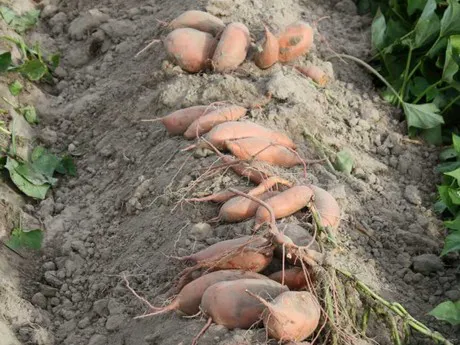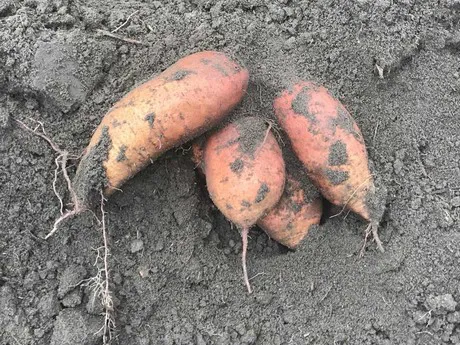The effects of Hurricane Florence on the North Carolina sweet potato crop will likely be felt for many months to come. It's more than likely that the true fallout won't be known until we get deep into the storage crop next year. In the immediate aftermath of the storm, growers left the fields to dry out to make sure any damaged potatoes would deteriorate in the field, rather than be combined with packed and stored potatoes.
Such decisions have meant that much of the crop will be salvaged, even in the more heavily affected eastern side of the state. It also reflects the experience that many North Carolina farmers have with such weather events.
"Most growers were out of the fields for about a week to ten days," said Jeff Thomas of Scott Farms. "We let things dry out to see what effects the rainfall would have on the fields. We took our time to make sure every patch had dried out. Where there was a section of sweet potatoes that had become too soft, we let them break down out in the fields in order to avoid any issues with our stored product. The Scott family are 6th generation farmers, so this level of expertise and experience manifests itself in times like these."
"Fortunately, our packing house and other infrastructure was undamaged and we were packing out sweet potatoes the following Monday," Thomas continued. "Also, the sweet potatoes are stored in our environmentally-controlled facilities to maintain optimum conditions for curing and storage."

Image: Scott Farms
Other parts of the state felt greatest impact from dry August
In other parts of North Carolina, growers said the rainfall - although significant - did bring some benefit to the sweet potato crop in that area. After a dry and hot August, the rain ran off the fields, resulting in very little damp and degraded spots. The main damage though was to the communities themselves. Many houses and buildings close to waterways like rivers became flooded.
"Before the hurricane, it had been very dry and water storage was low," shared George Wooten of Wayne E. Bailey Produce in Chadbourn. "We ended up getting 15 inches of rain but the water ran off into the surrounding rivers which caused flooding to a number of towns. We didn't have any water sitting in the fields on top of the potatoes. We avoided digging, however, for over a week to ensure whatever product was going to deteriorate did so before we recommenced harvesting."
Wooten continued by saying that any yield loss suffered was more likely due to the effects of the dry summer rather than the hurricane itself. "There will no doubt be some damage and yield is moderately down, but this is mainly because of decreased plantings this year as well as the dry August we had, combined with the heavy rain from Florence," he explained. "We've been working with our customers to meet expectations and handling requirements moving forward. Prices are going to be higher this year which will flow onto consumers and likely moderate demand. This will serve to stretch out inventories towards the end of the storage crop."

Hand harvesting beneficial
Because of the nature of the sporadic crop availability and need for vigilance when it comes to selecting product to pack, Thomas noted that the practice of hand harvesting has been beneficial. "For the most part, quality is good," he explained. "There are some still breaking down, but because we hand harvest, we are only picking up the best quality product from the field. By hand harvesting, we ensure consistent and good quality sweet potatoes."
The hurricane has though, delayed the harvest considerably which is putting pressure on growers to get product in before much cooler weather arrives. "Sweet potatoes are a tropical crop, so because of the delay, we are making sure to get the product in now as fast as possible before cooler weather moves in," Thomas said.
Export impact will take longer to determine
There is definitely going to be a shortage of sweet potatoes this year. Of course, a considerable portion of North Carolina's sweet potato crop is destined for the export market. The impact on this market is going to take longer to determine, but growers are already working with their counterparts and colleagues overseas.
"It is still too early to tell the lasting effects of the hurricane and other weather events North Carolina experienced regarding exports," Thomas noted. "We are in constant contact with our offices in the UK and the Netherlands to make sure our overseas customers are looked after. We at Scott Farms have a responsibility to our customers all over the world to be diligent in providing the best quality products available."
For more information:
Jeff Thomas
Scott Farms
Tel: +1 (919) 284-4030
jeff@scottfarms.com
www.scottfarms.com
George Wooten
Wayne E. Bailey Produce Company
Tel: +1 (910) 654-5163
mrsweetpotato@sweetpotates.com
www.sweetpotatoes.com
